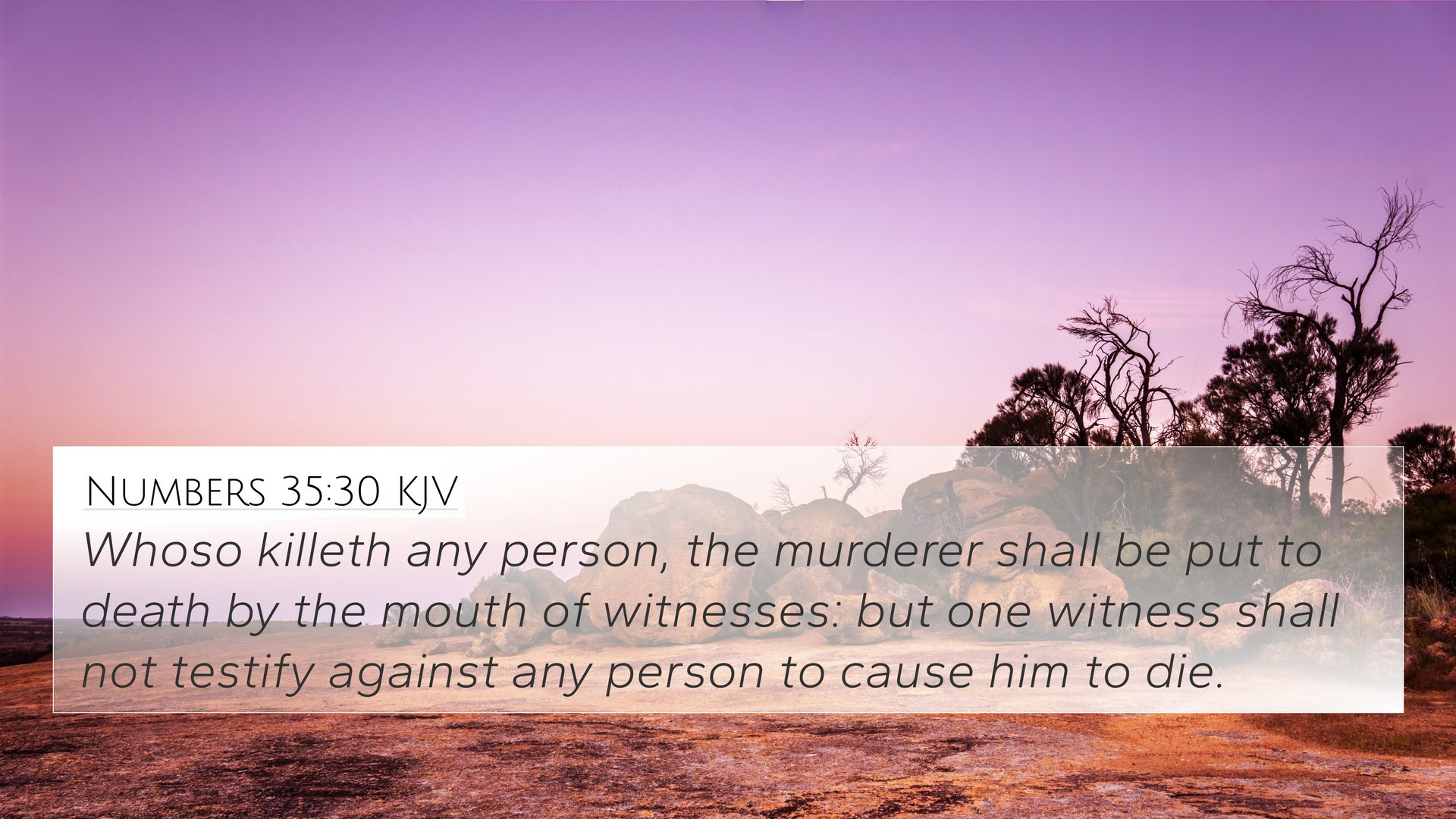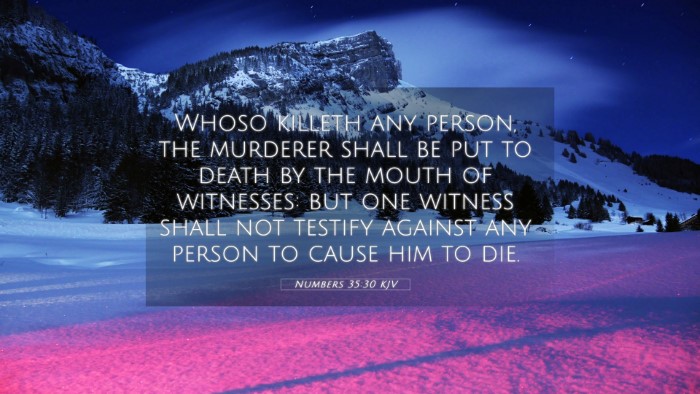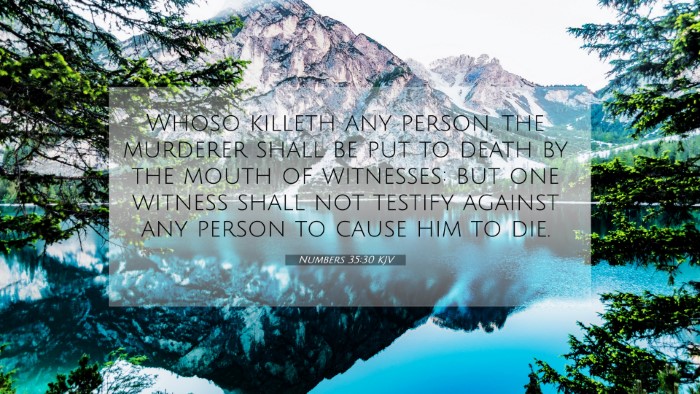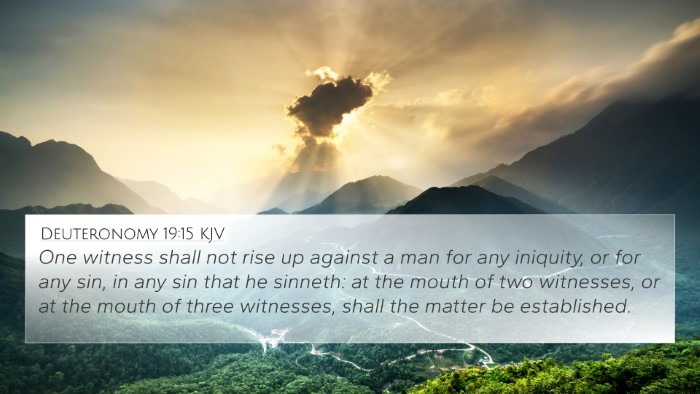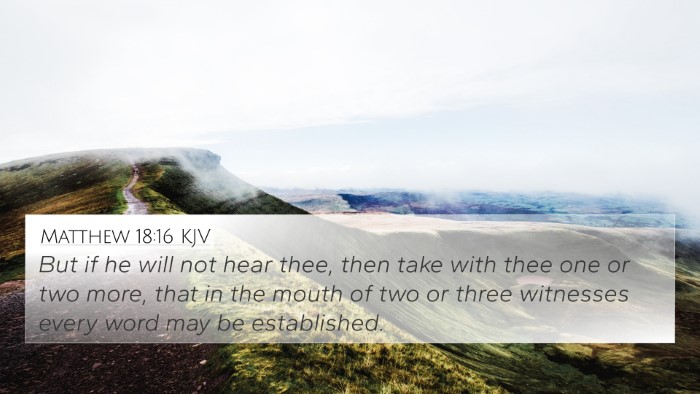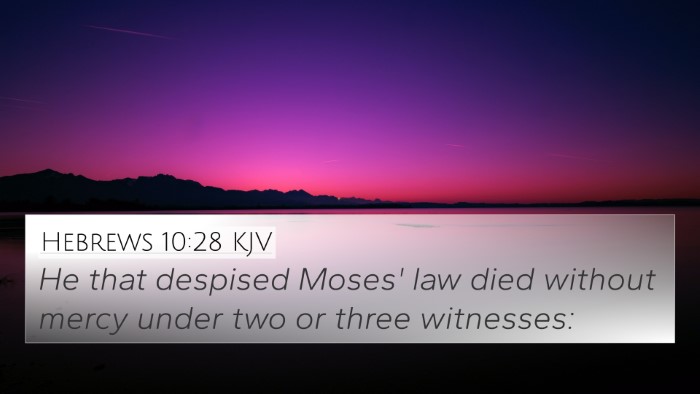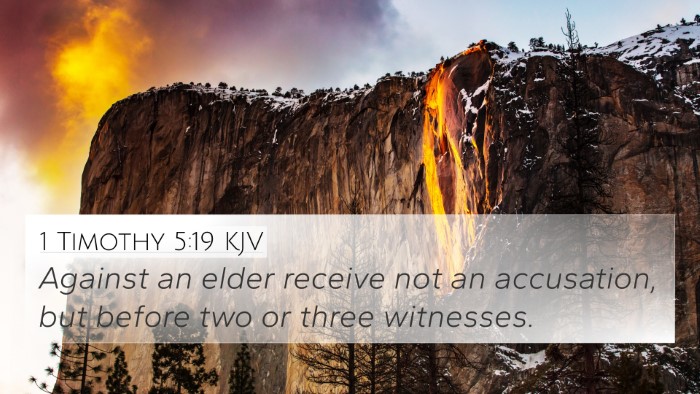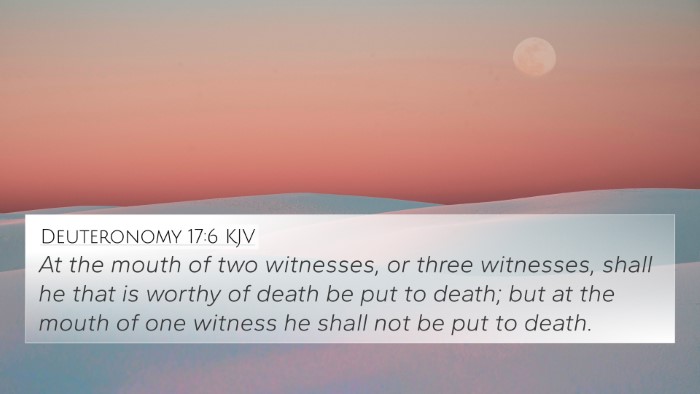Understanding Numbers 35:30
Numbers 35:30 states: "Whoso killeth any person, the murderer shall be put to death by the mouth of witnesses: but one witness shall not testify against any person to cause him to die." This verse lays down the principle of justice concerning murder and emphasizes the biblical requirement of multiple witnesses for establishing guilt in capital cases.
Summary of Meaning
This verse underscores several crucial themes in biblical law:
- Justice: It highlights the importance of a fair trial and due process, ensuring that the accused is only convicted based on adequate evidence.
- Witnesses: The need for multiple witnesses indicates a safeguard against wrongful convictions, recognizing human fallibility.
- Moral Responsibility: It establishes the gravitas of taking a life and the severe consequences that follow the act of murder.
Insight from Commentaries
These insights harmonize across several prominent public domain commentaries:
- Matthew Henry: He emphasizes the weight of a murder charge and the necessity for clear, corroborated evidence before executing judgment. Henry warns against the dangers of rushing to conclusions without sufficient proof.
- Albert Barnes: Barnes underlines the legal and social implications of this verse, explaining that the law was designed to protect the innocent while ensuring accountability for the guilty. He notes that the presence of multiple witnesses serves as a divine provision for justice.
- Adam Clarke: Clarke elaborates on the Hebrew context and the importance of witness testimonies in ensuring a righteous legal process. He stresses the moral implications of the law, indicating that it reflects God’s standard for justice.
Cross-References
This verse can be linked to various other scriptures that expound on similar themes of justice and the necessity of testimonies:
- Deuteronomy 17:6: "At the mouth of two witnesses, or three witnesses, shall he that is worthy of death be put to death; but at the mouth of one witness he shall not be put to death." This reinforces the necessity for multiple witnesses.
- Deuteronomy 19:15: "One witness shall not rise up against a man for any iniquity, or for any sin, in any sin that he sinneth: at the mouth of two witnesses, or at the mouth of three witnesses, shall the matter be established." It emphasizes the protection against false accusations.
- Matthew 18:16: "But if he will not hear thee, then take with thee one or two more, that in the mouth of two or three witnesses every word may be established." This illustrates the continuity of the principle in the New Testament.
- John 8:17: "It is also written in your law, that the testimony of two men is true." Jesus affirms the necessity of multiple witnesses within His ministry.
- 1 Timothy 5:19: "Against an elder receive not an accusation, but before two or three witnesses." The apostle Paul reiterates the need for witness verification in church governance, linking the principle to ecclesiastical matters.
- Hebrews 10:28: "He that despised Moses' law died without mercy under two or three witnesses." This serves to highlight the serious nature of transgressing the law, stressing the weight of the judgment that requires corroboration.
- Proverbs 18:17: "The first one to plead his cause seems right, until his neighbor comes and examines him." This stresses the importance of hearing multiple perspectives before passing judgment.
- Acts 7:58: "And cast him out of the city, and stoned him: and the witnesses laid down their clothes at a young man's feet, whose name was Saul." Here, the act of stoning Stephen shows the application of the law in community actions against individuals accused of crimes.
- Revelation 22:18: "For I testify unto every man that heareth the words of the prophecy of this book, If any man shall add unto these things, God shall add unto him the plagues that are written in this book." Although it pertains to prophecy, it illustrates the need for trustworthy testimonies.
Connections Between Bible Verses
The connections between these verses deepen our understanding of Numbers 35:30 and highlight the thematic continuity in Scripture regarding justice, truth, and the importance of witnesses. They serve as a foundation for a comprehensive study of biblical justice:
- Linking Bible Scriptures: By cross-referencing these passages, one can observe a clear biblical thread emphasizing the need for confirmed testimony in serious matters.
- Comparative Bible Verse Analysis: Analyzing these references shows how the theme of justice permeates both the Old and New Testament, providing a holistic view of God’s law.
- Scriptural Cross-Referencing: Utilizing tools for cross-referencing such as Bible concordances can enhance one’s study, making connections that strengthen the understanding of justice in the biblical narrative.
Thematic Bible Verse Connections
This verse about the accountability of murderers invites deeper reflections on a few vital themes:
- Moral Law: The universality of moral principles manifested in these scriptures points towards God's ultimate justice.
- Human Fallibility: Recognizing the fallibility of human testimony leads to an appreciation for divine standards of justice, which can only be fulfilled in Christ.
Conclusion
Numbers 35:30 lays a foundational precedent regarding the seriousness of crime and the necessity for justice through verified testimony. Through cross-referencing, we can navigate these themes and explore how related scriptures deepen our understanding of biblical law and morality.
